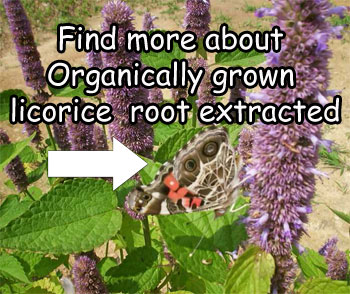Health benefits of licorice
Licorice is popular for its soothing effect on the inflamed mucous membrane of the lungs, throat, stomach and intestine. Licorice is also good for enlarged prostate, ulcers, coughs and bronchitis, allergies, urinary tract irritation, liver disorder, adrenal stress, excema and other immune system disorders.
Licorice known as ‘sweet root’ has a major active ingredient called glycyrrhizic acid that’s almost fifty times sweeter than sugar. Glycyrrhizic acid prevents conversion of testosterone to dydrotestosterone which means it reduces the symptoms of enlarged prostate which are swelling of prostate and frequent urination. Glycyrrhizic acid also reduces inflammation by removing excessive mucous and improving movement of leucocytes in inflamed areas.
Besides glycyrrhizic acid, there are other active ingredients in licorice such as liquiritin and the antioxidant flavonoids called liquiritigenin. Licorice also contains powerful antibacterial compounds (including the ones that kill ulcer-causing bacteria), can lower inflammation, boost immune system and improve blood sugar signaling, canker sores, and reflux (GERD).
Licorice can improve the immune system and reduce inflammation and risk of yeast or fungal infection like Candida:
According to a study published in the International immunopharmacology, the main ingredients in licorice known as antioxidant flavonoids liquiritin and liquiritigenin can increase the immune system and lower the risk of Candida growth. http://www.ncbi.nlm.nih.gov/pubmed/19264152
The results of another study published in the British Journal of Pharmacology indicated that that liquiritigenin has strong anti-inflammatory effects. According to the study, “anti-inflammatory effects of liquiritigenin results from the inhibition of NF-kappaB activation in macrophages, thereby decreasing production of iNOS and proinflammatory cytokines. Also, inhibition by liquiritigenin of paw oedema as well as inflammatory gene induction will help to understand the pharmacology and mode of action of liquiritigenin, and of the anti-inflammatory use of Glycyrrhizae radix”. http://www.ncbi.nlm.nih.gov/pubmed/18332856
Healing stomach ulcers:
Few studies have shown that licorice can treat stomach ulcers. In an animal study, the researchers found out that licorice reduced the number of ulcers in rats by 50%. In yet another study, 90% of all participants who took licorice root fluid extract had fewer symptoms and ulcers disappeared in 22% of the participants.
Helping adrenal fatigue:
Poor eating habits, constant stress, environmental toxics and lack of physical activity can all lead to a condition known as adrenal fatigue. Taking licorice root is known to help adrenal fatigue when the body is under constant stress and the immune system is compromised. The main ingredient in licorice root known as glycyrrhiza can influence cortisol-cortisone balance in the body by reducing the breakdown of cortisol in the blood. Keep in mind, cortisol reacts with aldosterone receptors which increases potassium excretion and sodium reabsorption and results in increased blood pressure levels. Individuals who are taking other diuretics or have high blood pressure should not take licorice.
Weight loss:
A study showed that taking licorice root for two month could help people to lose body fat by suppressing hormone aldosterone. In one study, the active ingredient in licorice, glycyrrhetinic acid was a major factor in helping participant to lose fat in their tights. Other studies have shown that licorice helps to reduce body fat and lower bad cholesterol levels.
As beneficial as licorice is people who have had a history of heart disease, heart failure, high blood pressure, diabetes, kidney and liver diseases and cancer should not take licorice. Too much licorice can cause high blood pressure and heart disease and you should consult with your physician before taking licorice.
Licorice should not be used more than 4 to 6 weeks and pregnant or breastfeeding women should not take licorice.
Sources:
http://umm.edu/health/medical/altmed/herb/licorice
http://www.naturalnews.com/031120_licorice_root_adrenal_fatigue.html



